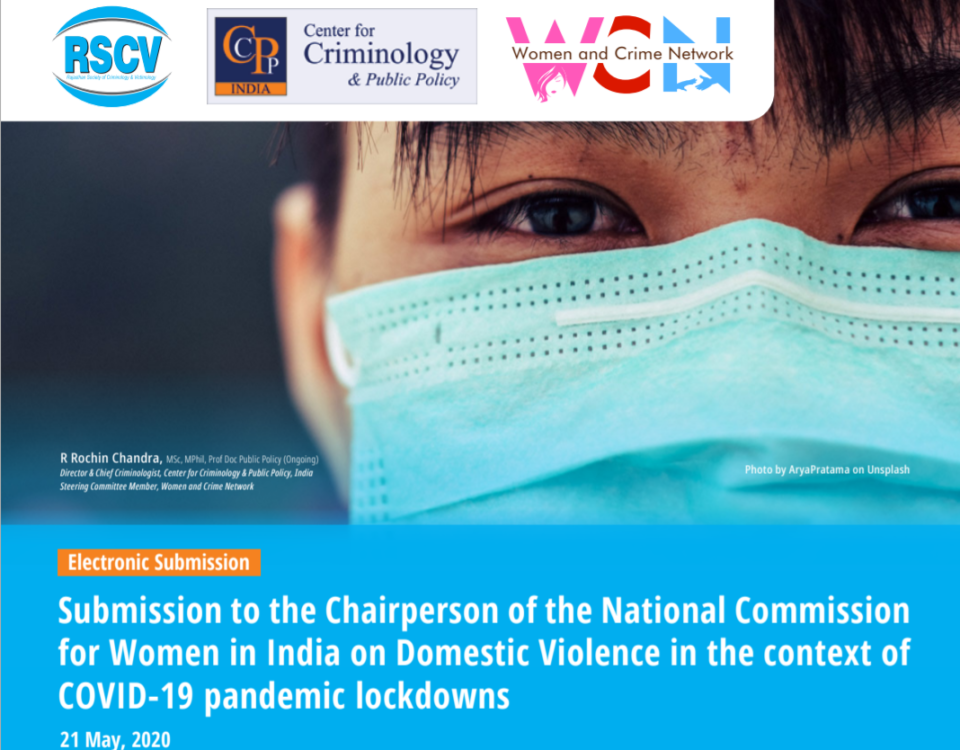Policy Provocation 1: Why Should Indian Police Join Hands With Criminologists?

राजस्थान में दुष्कर्म से पीड़ित बच्चियों को धीमे न्याय
September 9, 2018
Center for Criminology & Public Policy: A new think-tank to help solve India’s crime problems
September 9, 2018April 12,2018
Updated: May 29, 2019
Policy Provocation: Why Should Indian Police Join Hands With Criminologists?
Executive Summary
The nature of crime is ever-changing. Consequently, policing and crime reduction strategies must also evolve. With India’s modern-day crime profile straining the limited police resources, this evidence brief offers a possible solution: the integration of academic criminologists into the crime fighting operations of the police. It discusses how this model can improve police work and lead to economical, practical and social benefits.
In the West (particularly the US, Australia and the UK) the potential for academic professionals to enhance the capacity of the police is widely recognised, and accordingly police-academic collaboration is well established. These complementary partnerships are embedded and highly valued in forces across these countries. However, in India there remains an aversion and scepticism from the police towards academic or ‘outsider’ knowledge.
Acknowledging that India’s crime and policing dynamics differ significantly from the West, this evidence brief highlights a number of police-researcher partnerships that have already been implemented within particular Indian cities and states (Ahmedabad, Kerala). Such engagements are a two-way street and a mutually beneficial exchange of knowledge rather than – as is often perceived by the police – academics simply imposing external knowledge or critical judgment of police practice. Collaborations such as these have the potential to optimize police resources, reduce crime and build safer communities.
This evidence brief begins by asking some fundamental questions about the mindset of Indian policing, and discussing the limitations of current policing approaches. It then briefly examines the public expectation of police, before analyzing the average police response time, police-to-population ratio, and staff deployment in non-policing duties. Finally, it highlights some of the effective models of policing in India, and uses them to present the case for integration of academic criminologists into police departments.
Also provided with this brief are the key considerations for planning and implementing police-criminologist research collaborations, not to mention the proposal to organize a policy meeting – comprising police leaders, policy-makers, academic criminologists and heads of criminal justice universities and think-tanks – to deliberate on the ideas and recommendations presented in this brief.
Although the brief embraces different terms to demonstrate the utility of police-criminologist partnerships, it concludes that police leadership must align its organizational culture and values with effective use of ‘outsider knowledge’. By doing this, it argues that police executives will understand the value of science in policing, develop their skills to implement research findings, and place support for the use of evidence in police decision-making.
Summary of Recommendations
This policy proposal has three key recommendations for institutionalizing best practices in policing.
1. Encourage Police-Academic Criminologist Partnerships
Adopting what is known as ‘translational criminology’, academic criminologists can be called upon by the police to work with them on particular projects and initiatives. Here, the police practitioners and criminologists work in equal partnership to develop and implement policies, programmes and skills based on scientific knowledge. This is a form of knowledge exchange whereby police officers describe their experiences of day to day crime fighting to academic criminologists, who in turn analyze this information with police data and conduct ethnographic investigations in order to explain conditions that attract opportunities for crime. These findings are subsequently used by police executives to review their policing strategies (as to what they should be doing and what they should not be doing), while academic criminologists work closely with police to evaluate the impact of their policies, practices and programs. Translational Criminology’ is inherently reciprocal in nature, with such partnerships operationalizing academic expertise to supplement and add value to existing police knowledge.
2. Sharing Crime Data for Better Safety Outcomes
When academic criminologists have access to crime data, it allows them to apply their expertise and data analysis skills to draw out trends and meaning. For example, after analyzing data showing the place and time of crime occurrences, they can help police executives understand ‘why’ certain areas may experience high levels of crime at particular times. Similarly, by accessing police crime data, academic criminologists can explain, for example, the victim-offender characteristics and the likelihood of victimization. These insights may be used by police executives for effective formulation of budget and to discover strategies (e.g., personnel deployment, preventive patrolling, early intervention or crime-prevention programs, etc.) for addressing crime problems.
3. Integration of Academic Criminologists in the Police Academy
Adopting the ‘Embedded Criminologist’ model would see academic criminologists integrated into police academies. Here, they would hold the responsibility of training police probationers and providing them with access to specialist knowledge and skills. This policy would allow police probationers to become sensitized to the scientific aspects of crime, enhance their understanding of criminal behavior, and effectively tackle crime. Alongside this, academic criminologists may also foster a culture of innovation within police academies which is critical to the success of policing.
In the UK, this model is being developed and gradually implemented in the form of Policing Education Qualifications Framework (PEQF). This approach ensures that police officers have consistent and appropriate skills to meet the shifting challenges of addressing crime.



